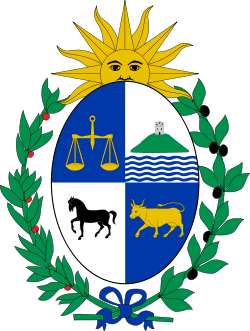Argentina–Uruguay relations
 |
|
Argentina |
Uruguay |
|---|---|
Argentina–Uruguay relations are foreign relations between the Argentine Republic and the Eastern Republic of Uruguay. Both countries were part of the Spanish Empire until the early 19th century.
History
Initially, both modern states of Argentina and Uruguay were part of the Viceroyalty of the Río de la Plata. Buenos Aires was by then the Capital city, and the Banda Oriental a province of it. During this period, both Buenos Aires and Montevideo faced two British invasions of the Río de la Plata. In the first one, the British successfully invaded Buenos Aires, being defeated later by a Montevidean army led by Santiago de Liniers. The British invaded Montevideo the second time, but failed to invade Buenos Aires, and Buenos Aires demanded the liberation of Montevideo in the British capitulation.

The Spanish king Ferdinand VII was captured during the Peninsular War, and replaced by the French Joseph Bonaparte. He was not recognized as a legitimate king, which left the Spanish monarchy without a ruler. This generated political reactions all across the Spanish Empire. Despite being of French ancestry, Liniers rejected Joseph's rule and confirmed his allegiance to the captive king, but Javier de Elío did not trust him, and created a government Junta in Montevideo. Martín de Álzaga, Elío's ally in Buenos Aires, attempted to do the same by organizing a mutiny, but failed. Elío gave up his junta when Liniers was replaced by a new viceroy, Baltasar Hidalgo de Cisneros. However, as the Spanish situation in the Peninsular War worsened, Buenos Aires deposed Cisneros during the May Revolution and create their own junta. This started the Argentine War of Independence. Montevideo was declared then the new capital of the viceroyalty, and became a Royalist stronghold. The other populations of the Banda Oriental, however, did not join Montevideo. Led by José Gervasio Artigas, they made the cry of Asencio and laid siege to the city until its defeat.
Uruguay gained its independence after the Cisplatine War, with the help of Great Britain. During the Uruguayan Civil War, Argentina supported the National Party. Both countries were allied during the War of the Triple Alliance.
Since the end of the 19th century, both countries have shared a similar European heritage. They likewise share very close economic, cultural and political ties with each other. Moreover, since around 1960, there has been significant Uruguayan emigration to Argentina, and today, there are around 120,000 people born in Uruguay living in Argentina.[1]
Strained relations during the Kirchner era
Following the announced construction of a pulp mills on the Uruguayan side of the Uruguay River by Spanish manufacturer ENCE in 2003, both countries experienced their first significant diplomatic tensions since President Juan Perón attempted in 1952 to curb Argentine offshore banking in the neighboring nation. Though plans for the ENCE mill were canceled in 2005, a second mill was announced by Finland's Botnia in 2005, and the facility was opened in 2007.[2] The Pulp mill dispute between Argentina and Uruguay remains a subject of controversy, particularly after ongoing reports of growing water contamination in the area that were later proved to be sewage discharge from the actual town Gualeguaychú itself.[3][4]
With the imminent inauguration of President elect Mauricio Macri, there are high stakes that the relations between both countries may improve. The future Argentine ambassador destined to Montevideo is Guillermo Montenegro.[5]
Today
Argentina has an embassy in Montevideo, 4 consulates (in Colonia del Sacramento, Fray Bentos, Paysandú and Salto). Uruguay has an embassy in Buenos Aires and 2 general consulates (in Córdoba and Rosario), 3 consulates (in Colón, Concordia and Gualeguaychú), 2 honorary consulates (in Mendoza and Neuquén).
Both countries were founding members of the Mercosur. Both countries are full members of the Group of 77, of the Rio Group, of the Latin American Integration Association, of the Association of Spanish Language Academies, of the Organization of American States, of the Organization of Ibero-American States, of the Union of South American Nations, and of the Cairns Group.
Uruguay in 2009 maintained its policy of refusing landing rights for British military planes on their flights to the Falkland Islands (Spanish: Islas Malvinas) [6] and in 2010 refused entry to the Port of Montevideo of HMS Gloucester [7]
See also
References
- ↑ INDEC
- ↑ BBC News: Argentines in pulp mill protest (11 Nov 2007)
- ↑ La Fraybentina: Las mentiras tienen patas cortas (1 Mar 2010) (Spanish)
- ↑ Clarín: Hay 115 casos de dermatitis en un balneario ubicado frente a Botnia (22 Feb 2010) (Spanish)
- ↑ "An ambassador from Macri's inner circle". EL PAIS. 3 December 2015.
- ↑ Uruguayan President Tabaré Vázquez: speech during 2009 Bariloche UNASUR Summit
- ↑ Uruguay negó el ingreso a Montevideo de un barco británico que iba a Malvinas
External links
| Wikimedia Commons has media related to Relations of Argentina and Uruguay. |
- Argentine Ministry of Foreign Relations: list of bilateral treaties with Uruguay until 1993 (in Spanish only)
- Argentine Ministry of Foreign Relations: list of bilateral treaties with Uruguay from 1994 (in Spanish only)
- Argentina embassy in Montevideo (in Spanish only)
- Uruguayan embassy in Buenos Aires (in Spanish only)

